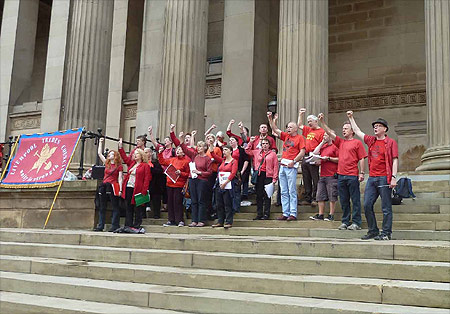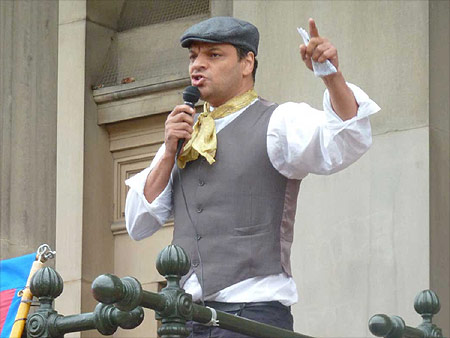
| HOME |
| NERVE |
| REVIEWS |
| ARCHIVE |
| EVENTS |
| LINKS |
| ABOUT US |
| CONTRIBUTORS |
| BACK ISSUES |
| CONTACT US |
 |
 |
Bloody Sunday Rally
By Jeremy Hawthorn 16/8/2011
Over 100 people gathered on St George's Plateau on Saturday 13th August to mark the 100th anniversary of Liverpool's Bloody Sunday. The rally was called by Liverpool Trades Council.
The meeting was opened by Liverpool Socialist Singers' rendering of Power in a Union and local singer Alun Parry's tribute to the Limerick Soviet.
Ritchie Hunter, for the Trades Council and Nerve magazine, then related the events of Bloody Sunday. Over 80,000 people had demonstrated peacefully on the plateau as a critical time during the city's transport strikes. They had been attacked by police who rampaged out of Lime Street Station. Troops positioned in St George's Hall had also come out to join in breaking up the rally.
More than 180 people had been taken to hospital. Two days later two men had been shot by soldiers on Vauxhall Road.
Ritchie then introduced 'someone who was there at the time' (played by Carl John of Dingle Community Theatre - photo right). Carl recited the 'Don't Shoot' leaflet that was written in August 1911. The leaflet was a message to soldiers, urging them not to open fire and kill civilians. "Our fight is your fight," the leaflet said, "Think things out and refuse any longer to murder your kindred."
To close the rally the Socialist Singers led the crowd in singing the Internationale.
Sorry Comments Closed
Comment left by peacefairy on 2nd September, 2011 at 9:15
Carl John was amazing and inspirational as I expect was the original speaker,its a shame that there was so few people of Liverpool interested remembering how our forbearers suffered for our rights to be enjoyed today
Comment left by Nerve Magazine on 6th September, 2011 at 12:03
A comment made by Martin Balmer, on 2nd September, 2011 has been removed because it was personalised and offensive. Nerve reviewers give their time freely to us and we value their efforts. We also value comments which add to the debate about the item being reviewed.
Nerve provides this open column as a forum for discussion. We are all for constructive criticism and comments which point out factual errors. We WILL NOT allow this space to be hijacked by purveyors of personal abuse.
If you would like to discuss the issues surrounding the events of 1911 and their relevance for today go to the conference on 8 October 2011: http://www.ljmu.ac.uk/HSS/HSS_Docs/Liverpool_1911_A6_3mm_bleed.pdf